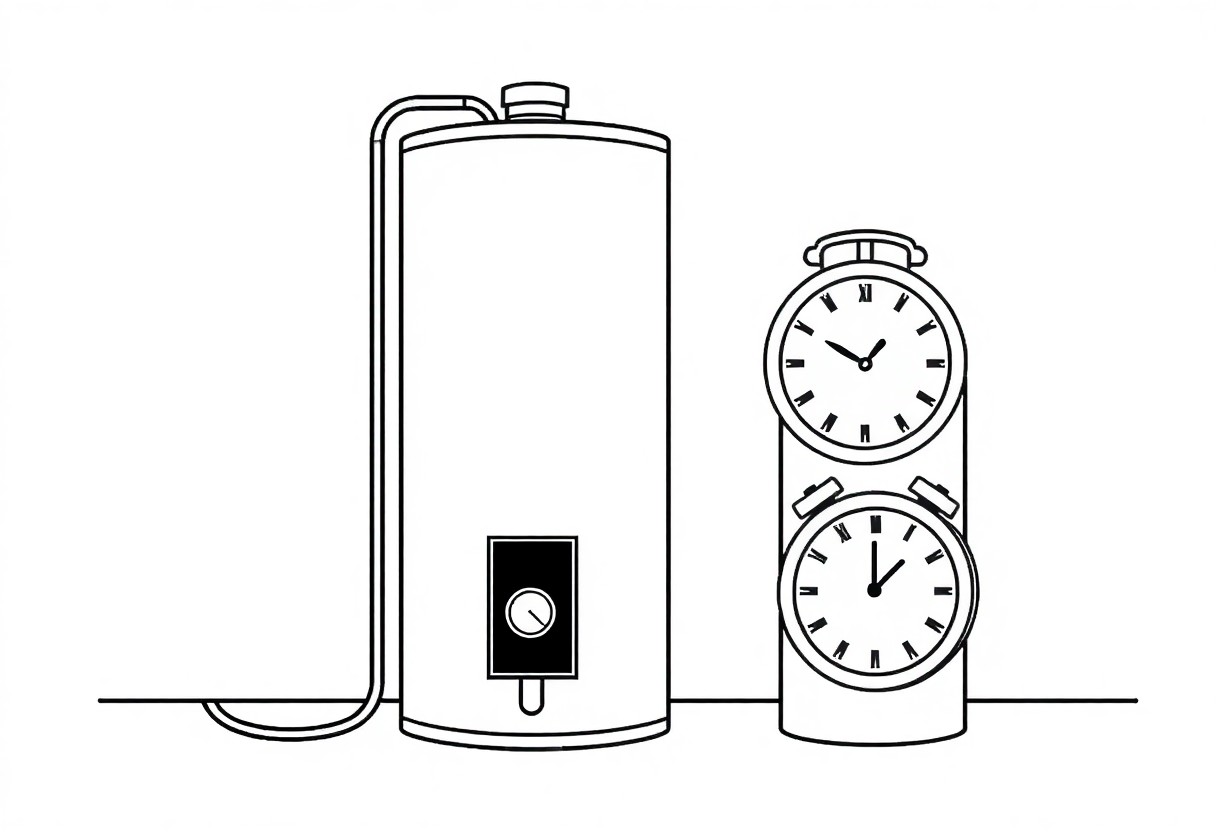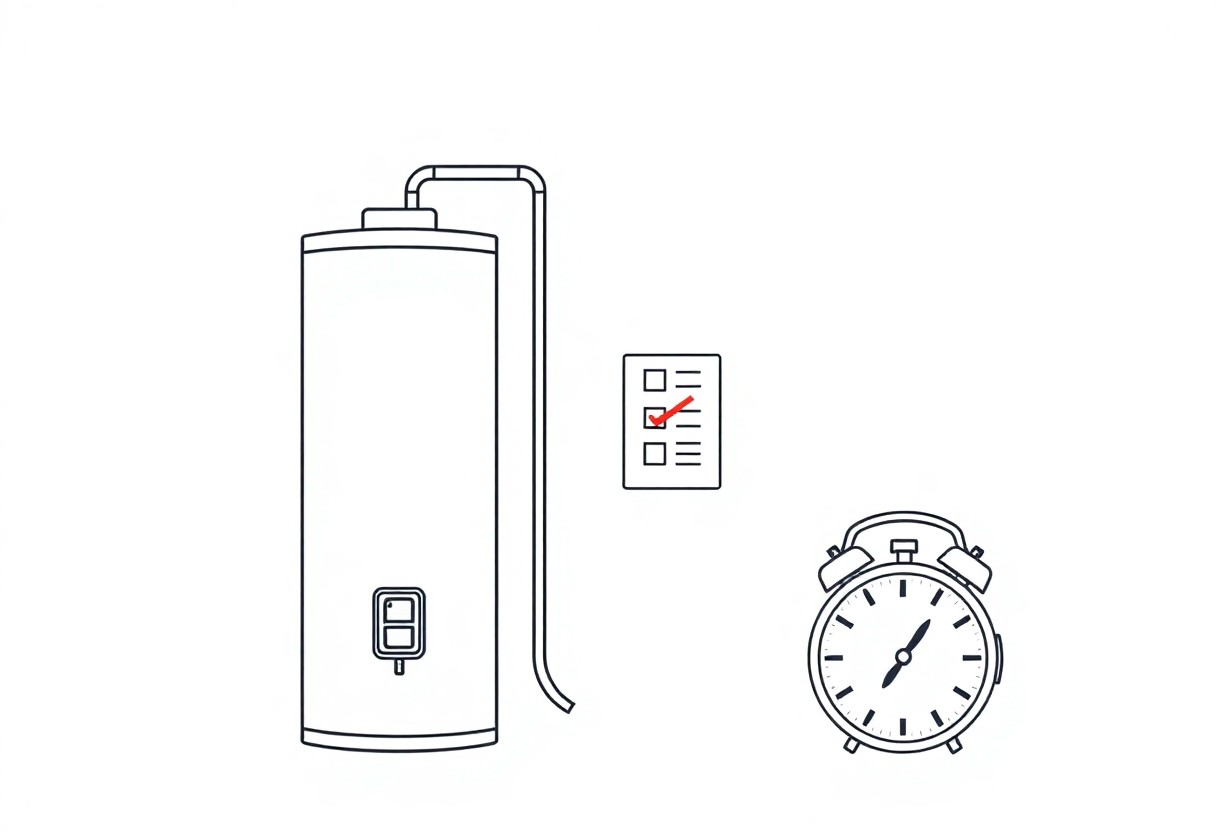Just like any appliance, your water heater has a limited lifespan, typically around 8 to 12 years. Knowing the age of your unit is important as an old water heater can lead to costly repairs, inefficient operation, and even potential leaks or bursts. You should look for signs such as strange noises, inconsistent water temperature, and rust or corrosion around the tank. By regularly assessing these factors, you can ensure your home remains safe and your water supply is reliable. In this post, you’ll learn how to identify if your water heater is reaching the end of its service life.
Key Takeaways:
- Check the age of your water heater; most units last between 8 to 12 years. If yours is older, it may need to be replaced.
- Look for signs of rust, leaks, or unusual noises, as these can indicate a failing water heater.
- Monitor water quality; a decline in hot water output or discolored water suggests issues that may require a unit upgrade.
Understanding Water Heater Lifespan
For many homeowners, recognizing the age of your water heater is imperative for efficient home maintenance. Water heaters typically have a standard lifespan, which can vary based on various factors like usage, model, and type. Knowing when to replace your unit can prevent unexpected failures and ensure a consistent supply of hot water, keeping your household comfortable.
Factors Affecting Water Heater Age
Lifespan factors contribute significantly to how long your water heater lasts. Here are some elements to consider:
- Quality of the unit
- Maintenance practices
- Water quality
- Usage patterns
- Installation quality
Assume that your water heater has been well-maintained, as this can arguably extend its lifespan.
Typical Lifespan of Different Water Heater Types
For different types of water heaters, their typical lifespans may vary significantly. Below is a breakdown of average lifespans based on type:
| Type | Average Lifespan |
| Tank Water Heater | 10-15 years |
| Tankless Water Heater | 20+ years |
| Heat Pump Water Heater | 10-15 years |
| Solar Water Heater | 20 years |
| Point-of-Use Heater | 5-10 years |
With this table, you can easily assess the potential variety in lifespan among different water heater types. If you want a long-term solution, consider choosing a model with superior durability. Here’s a recap of their lifespans:
- Tank Water Heaters: 10-15 years
- Tankless Water Heaters: 20+ years
- Heat Pump Water Heaters: 10-15 years
- Solar Water Heaters: 20 years
- Point-of-Use Heaters: 5-10 years
Knowing this information could save you both headaches and money down the line, so it’s worth keeping an eye on your water heater’s condition and age.
Signs Your Water Heater is Too Old
Now that you understand the average lifespan of a water heater, it’s important to look for specific signs that indicate your water heater is reaching the end of its time. Regular maintenance and awareness can help you identify issues before they become major problems, ensuring you have a reliable source of hot water in your home.
Decreased Water Temperature
An important sign that your water heater may be too old is when you notice a decrease in water temperature. This can manifest through inconsistent hot water supply or a water heater that can no longer reach your desired temperature. Below are some causes of decreased water temperature:
| Possible Cause | Description |
|---|---|
| Thermostat Issues | Your thermostat might be malfunctioning, affecting temperature regulation. |
| Mineral Buildup | Accumulation of minerals inside the tank can disrupt heating efficiency. |
| Old Age | Aging components can lead to decreased overall performance. |
Rusty or Discolored Water
Little things can indicate your water heater’s age, and one of the most alarming signs is when you start seeing rusty or discolored water coming from your taps. This suggests that the tank itself may be deteriorating.
Rusty water is often the result of corrosion occurring in the tank or pipes, which can be a sign that your water heater is nearing the end of its lifespan. If you observe any discoloration, it’s imperative to address the issue promptly, as it can lead to serious health risks and plumbing issues down the line. Make sure to consult a professional to assess your system’s safety and functionality. This is a clear signal that replacement should be considered to avoid potential hazards and to ensure you have safe, clean water for your household needs.

How to Assess Your Water Heater’s Age
Unlike other household appliances, your water heater may silently age without your acknowledgement. To determine its effectiveness and safety, you will need to assess its age. Common indicators include the serial number and installation date, which provide insights into how long it has been in use and if it may be time for a replacement. Regular assessments ensure you maintain optimal energy efficiency and minimize the risk of potential issues.
Checking the Serial Number
There’s a significant clue to your water heater’s age in its serial number. Typically found on the manufacturer’s label, the first few digits often indicate the production date. By decoding this information, you can accurately determine how many years your water heater has been operational, helping you make informed decisions regarding necessary maintenance or replacement.
Evaluating Installation Date
To accurately evaluate your water heater’s age, it’s important to know the installation date. This date can be less obvious but is typically noted on the paperwork you received during installation or can be estimated based on the last replacement or major maintenance.
Assess the installation date by locating any documentation you have regarding your water heater. If you can’t find formal records, consider asking a plumber for assistance or check for any installation tags still attached to the unit. Knowing the installation date allows you to gauge its lifespan: most water heaters last between 8 to 12 years. If your unit is nearing or surpassing this range, you might want to consider a replacement to avoid the dangers of leaks or failure, ensuring you maintain a safe and efficient home.
Tips for Maintaining an Older Water Heater
To ensure the longevity of your aging water heater, follow these maintenance tips:
- Flush the tank annually to remove sediment buildup.
- Inspect the anode rod every 2-3 years and replace it if needed.
- Check the temperature setting; keep it at 120°F for safety and efficiency.
- Examine the insulation around the heater and pipes to reduce energy loss.
By incorporating these practices, you can maintain your water heater effectively. Knowing when to employ these measures will extend its lifespan and efficiency.
Regular Maintenance Practices
To keep your older water heater functioning well, implement regular maintenance practices such as checking for leaks, ensuring proper drainage, and periodically testing the temperature-pressure relief valve. These tasks not only improve performance but can also save you from unexpected repairs and higher energy bills.
When to Call a Professional
Maintenance is sometimes beyond your skills, and that’s when you should consider calling a professional. If you notice persistent leaks, strange noises, or a significant drop in hot water supply, it might indicate underlying issues. These problems could lead to serious consequences, such as water damage or even fire hazards. It’s important to take immediate action if your water heater shows signs of malfunction. When these situations arise, don’t hesitate to seek expert help to ensure your safety and the proper functioning of your system.

Replacement Considerations
Despite the potential complications involved, replacing your old water heater can lead to enhanced efficiency and reliability. As you evaluate your options, consider not only the initial purchase but also the long-term benefits of energy savings and improved performance. Investing in a new model can save you significant repair costs and extend the life of your hot water supply.
Choosing the Right Replacement Model
Assuming you’ve decided to replace your water heater, you’ll find various models available today. Look for one that meets your home’s hot water demands while being efficient. Consider whether you want a traditional tank, which stores a large volume of hot water, or a tankless model, which heats water on demand. Evaluate factors such as fuel type (gas or electric), energy efficiency ratings, and capacity to ensure an optimal fit for your needs.
Cost Factors to Consider
Model selection goes hand in hand with a thorough evaluation of cost factors. Here’s what you should take into account:
- Initial Purchase Price: This includes the cost of the heater itself.
- Installation Costs: Professional installation fees can vary widely.
- Operating Costs: Look at energy bills associated with different models.
- Maintenance Expenses: Consider how often the unit will require service.
Knowing these elements will help you make a well-informed decision that aligns with your budget and needs.
A thorough understanding of cost factors associated with a new water heater can significantly impact your financial planning. Here’s a deeper explore the considerations:
- Energy Efficiency: Investing in a higher efficiency model can lower your utility bills.
- Warranties: Longer warranties may indicate better quality but could also affect pricing.
- Rebates and Incentives: Research local programs that might lower upfront costs.
- Alternative Energy Sources: Solar or hybrid models may have higher upfront costs but can lead to savings in the long run.
Knowing these factors will empower you to choose the right model that fits both your budget and your home’s hot water needs.
The Importance of Timely Replacement
Keep in mind that replacing your water heater in a timely manner can save you from unexpected expenses and discomfort. An outdated unit may consume more energy, leading to inflated utility bills, and could also result in inconvenient breakdowns. By investing in a new water heater before your existing one fails, you ensure reliable hot water supply and improved efficiency, ultimately protecting your home and peace of mind.
Risks of Keeping an Old Water Heater
Clearly, retaining an old water heater poses significant risks that can impact both your finances and your safety. Aging units are more prone to leaks and corrosion, potentially leading to water damage and costly repairs. Moreover, they may not adhere to current efficiency standards, causing your energy costs to spike and increasing your carbon footprint.
Benefits of Upgrading
Risks associated with old water heaters are evident, but the advantages of upgrading far outweigh them. An upgraded model often includes advanced technology that promotes energy efficiency, reducing your monthly bills. Additionally, new units typically have improved safety features, minimizing the risk of leaks, explosions, and other hazards.
It is necessary to recognize that upgrading to a modern water heater brings multiple benefits. You can expect enhanced energy efficiency, leading to savings on utility bills. Moreover, new water heaters are designed with improved safety features that protect you from potential hazards associated with aging models. The installation of a reliable unit ensures consistent hot water supply while increasing the value of your home. This proactive step can significantly enhance both your living comfort and the overall efficiency of your household.
To wrap up
From above, you can determine if your water heater is becoming too old by checking its age, observing signs of wear and tear, and monitoring performance issues like inconsistent temperatures or strange noises. If your unit is over 10 years old and you notice these symptoms, it may be time to consider a replacement to avoid unexpected breakdowns and ensure efficiency. Regular maintenance also helps extend the life of your water heater, so staying proactive can save you time and money in the long run.
FAQ
Q: How can I determine the age of my water heater?
A: The age of your water heater can typically be found on the manufacturer’s sticker, which is usually located on the upper part of the tank. The sticker often includes a serial number that can be deciphered using the manufacturer’s guidelines. Generally, the first two digits indicate the year of manufacture. If you cannot locate the sticker, you may also check the owner’s manual or consult the manufacturer’s website for assistance.
Q: What are the signs that my water heater may be too old?
A: There are several signs that may indicate your water heater is aging. These include: inadequate hot water supply, strange noises such as banging or popping, discoloration or sediment buildup in the water, leaks or puddling around the heater, and rust on the tank or plumbing connections. If you notice any of these issues, it may be time to consider replacing your unit.
Q: What is the average lifespan of a water heater?
A: The average lifespan of a traditional tank water heater is about 8 to 12 years, while tankless models can last up to 20 years with proper maintenance. However, this can vary based on the model, maintenance practices, and water quality in your area. Regular inspections and timely repairs can extend the lifespan of your unit.
Q: Are there any maintenance tips to prolong the life of my water heater?
A: Yes, regular maintenance can significantly prolong the life of your water heater. Consider flushing the tank annually to remove sediment buildup, checking and replacing the anode rod every few years, and inspecting the temperature and pressure relief valve for proper functioning. Additionally, setting the water heater temperature to a safe level (typically around 120°F) can help reduce strain on the system.
Q: What are the benefits of replacing an old water heater?
A: Replacing an old water heater can offer several benefits. Newer models are often more energy-efficient, which can result in lower utility bills. They are also more reliable, reducing the likelihood of unexpected breakdowns. Additionally, modern water heaters may include advanced features, such as improved safety mechanisms and even smart technology, providing better control over your hot water usage.

